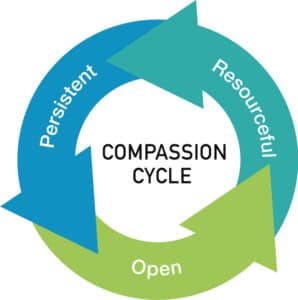
What Does The Dalai Lama Know About Compassionate Leadership?
Share viaDaniel Goleman has spent the last 30 years researching and developing the science of Emotional Intelligence, and is a friend of the Dalai Lama. Recently he was asked to write a book about the Dalai Lama’s compassionate approach to addressing the world’s most intractable problems. Just published in June 2020, Force for Good, is both an exploration of the science and the power of compassion and a call to action.
Here’s an interview with Goleman about the book, where he identifies three characteristics of the Dalai Lama’s approach to leadership.
According to Goleman, “The Dalai Lama thinks in terms of generations and of what’s best for humanity as a whole. Because his vision is so expansive, he can take on the largest challenges, rather than small, narrowly defined ones.”
This is the essence of Persistence, keeping an eye on what’s most important.
The Dalai Lama, “…gathers information from everywhere.”
This curiosity and thirst for information is the essence of Resourcefulness.
Third, “He seems to care about everybody, and the world at large.”
This is the essence of Openness, unconditional acceptance of our own and others’ being.
 Reading this, I realized two things. First, I was struck by how closely our Compassion Cycle parallels the Dalai Lama’s approach to leadership. Compassion is a process that requires openness, resourcefulness, and persistence. And, when it comes to interpersonal situations like conflict or difficult interaction, it matters where you start and in what order you go. Always start at Open because compassion rests on the foundation of human value, safety, and dignity.
Reading this, I realized two things. First, I was struck by how closely our Compassion Cycle parallels the Dalai Lama’s approach to leadership. Compassion is a process that requires openness, resourcefulness, and persistence. And, when it comes to interpersonal situations like conflict or difficult interaction, it matters where you start and in what order you go. Always start at Open because compassion rests on the foundation of human value, safety, and dignity.
The second thing I noticed was a lopsided emphasis on openness, specifically mindfulness meditation as as way to “…cultivate an attitude of loving kindness, or of concern, or of compassion, toward people.” I’m a big fan of mindfulness, but aligning compassion with mindfulness is one of several misconceptions about compassion.
Goleman was vague about what comes next, saying, “this has the effect of priming the circuitry responsible for compassion within the brain, so that you are more inclined to act that way when the opportunity arises.
So how do you get from “inclined to act” to real behaviors? What does it mean to act on compassion? What are the behaviors and strategies to actually live out Openness, Resourcefulness, and Persistence? How do you measure it and teach it?
If you want others to be happy, practice compassion. If you want to be happy, practice compassion. – Dalai Lama
We have a solution. Check out ORPO, our proven behavioral technology for compassion in leadership, outlined in my book, Conflict Without Casualties: A Field Guide for Leading With Compassionate Accountability, and taught in our Leading Out of Drama and Compassion Mindset programs.
Copyright Next Element Consulting, LLC 2020
Learn all about how to practice Compassionate Accountability in our upcoming virtual Leading out of Drama Core (LOD) Concepts course. View our calendar of events.
Book Your Next Keynote Speaker

Author and Co-founder of Next Element, Dr. Nate Regier is available to speak at your upcoming event.
Submit a Speaker RequestPodcast: Listen to Nate "On Compassion"
 Listen to the Podcast
Listen to the Podcast



0 Comments
Add comment